Related Research Articles
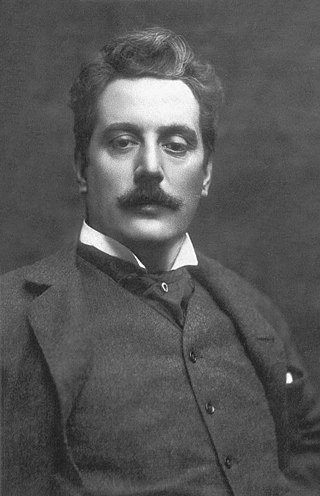
Giacomo Puccini was an Italian composer known primarily for his operas. Regarded as the greatest and most successful proponent of Italian opera after Verdi, he was descended from a long line of composers, stemming from the late-Baroque era. Though his early work was firmly rooted in traditional late-19th-century Romantic Italian opera, he later developed his work in the realistic verismo style, of which he became one of the leading exponents.

Sylvano Bussotti was an Italian composer of contemporary classical music, also a painter, set and costume designer, opera director and manager, writer and academic teacher. His compositions employ graphic notation, which has often created special problems of interpretation. He was known as a composer for the stage. His first opera was La Passion selon Sade, premiered in Palermo in 1965. Later operas and ballets were premiered at the Teatro Comunale di Firenze, Teatro Lirico di Milano, Teatro Regio di Torino and Piccola Scala di Milano, among others. He was artistic director of La Fenice in Venice, the Puccini Festival and the music section of the Venice Biennale. He taught internationally, for a decade at the Fiesole School of Music. He is regarded as a leading composer of Italy's avantgarde, and a Renaissance man with many talents who combined the arts expressively.
Gaius Helvius Cinna was an influential neoteric poet of the late Roman Republic, a little older than the generation of Catullus and Calvus. He was lynched at the funeral of Julius Caesar after being mistaken for an unrelated Cornelius Cinna who had spoken out in support of the dictator's assassins.
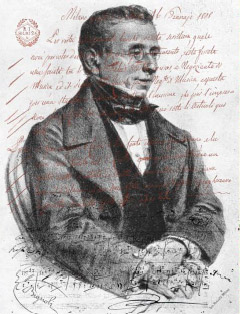
Casa Ricordi is a publisher of primarily classical music and opera. Its classical repertoire represents one of the important sources in the world through its publishing of the work of the major 19th-century Italian composers such as Gioachino Rossini, Gaetano Donizetti, Vincenzo Bellini, Giuseppe Verdi, and, later in the century, Giacomo Puccini, composers with whom one or another of the Ricordi family came into close contact.
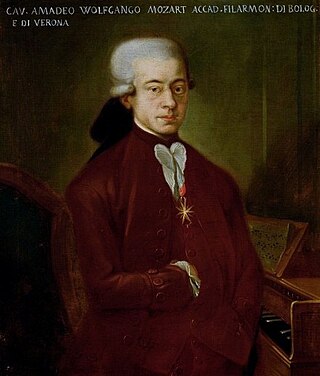
Lucio Silla, K. 135, is an Italian opera seria in three acts composed by Wolfgang Amadeus Mozart at the age of 16. The libretto was written by Giovanni de Gamerra, revised by Pietro Metastasio.
La leggenda di Sakùntala is a three-act opera by Franco Alfano, who wrote his own libretto, basing his work on Kālidāsa's 5th-century BC drama Shakuntala.
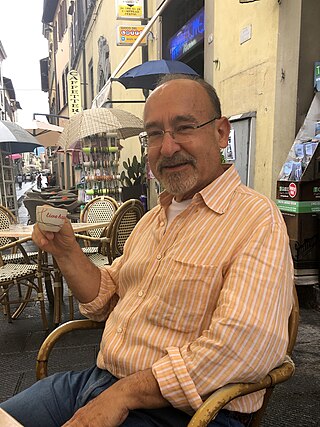
Salvatore Sciarrino is an Italian composer of contemporary classical music. Described as "the best-known and most performed Italian composer" of the present day, his works include Quaderno di strada (2003) and La porta della legge (2006–08).

Gianluigi Gelmetti OMRI, was an Italian-Monégasque conductor and composer.

The Music of Emilia-Romagna has the reputation of being one of the richest in Europe; there are six music conservatories alone in the region, and the sheer number of other musical venues and activities is astounding. The region, as the name implies, combines the traditions of two different, contiguous areas—Emilia and Romagna—and it is perhaps this blend that contributes to the wealth of musical culture.

Lorenzo Ferrero is an Italian composer, librettist, author, and book editor. He started composing at an early age and has written over a hundred compositions thus far, including twelve operas, three ballets, and numerous orchestral, chamber music, solo instrumental, and vocal works. His musical idiom is characterized by eclecticism, stylistic versatility, and a neo-tonal language.

The Teatro Comunale di Modena is an opera house in the town of Modena,, Italy. The idea for the creation of the present theatre dates from 1838, when it became apparent that the then-existing Teatro Comunale di via Emilia was no longer suitable for staging opera. However, this house had been the venue for presentations of all of the works of Donizetti, Bellini and Rossini up to this time, and a flourishing operatic culture existed in Modena.

Clorinda Corradi was an Italian opera singer and one of the most famous contraltos in history.

Guglielmo Zuelli was an Italian composer, conductor, and music educator. As a composer he achieved fame for his first opera Fata del Nord which premiered in Milan in 1884. Both his first and second opera, Mokanna o Il profeta del Korasan, were published by Casa Ricordi. However, his second opera has never been performed. His other compositions consist of several sacred choral works and a number of symphonic pieces written in a style similar to his contemporaries Giacomo Puccini, Alberto Franchetti, and Pietro Mascagni.
Géraldine Chauvet is a French operatic mezzo-soprano.
Marco Betta is an Italian composer.
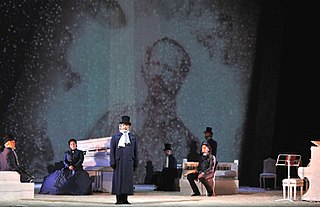
Risorgimento! is an opera in one act by Lorenzo Ferrero set to an Italian-language libretto by Dario Oliveri, based on a scenario by the composer. It was completed in 2010 and first performed at the Teatro Comunale Modena on 26 March 2011.
La figlia del mago is a children's opera in two acts by Lorenzo Ferrero set to an Italian-language libretto by Marco Ravasini. It was completed in 1981 and subtitled giocodramma melodioso, a wordplay on melodramma giocoso. The libretto, inspired by Mario Lavagetto's 1979 book Quei più modesti romanzi: il libretto nel melodramma di Verdi, is written in an imaginary language which emphasises the element of play. The music is a sequence of closed numbers "which spoof the most common operatic conventions." The aim of the opera is to show children how Italian opera functions. Alongside professional singers, children take mime roles.
Marilyn: Scenes from the '50s in two acts, is an opera by Lorenzo Ferrero set to a bilingual libretto by Floriana Bossi and the composer. The text consists of a collection of fragments taken from original political, social and cultural documents and has two different linguistic levels: English for the sung parts, and the language of the country in which the performance takes place for the spoken parts.

Amelia Felle is an Italian operatic soprano and voice teacher. Born in Bari, she has been active on the stages of Italian and European opera houses and concert halls since her debut in 1981. She holds the chair in vocal chamber music at the Conservatorio di Santa Cecilia in Rome, a position she previously held at the Conservatorio Tito Schipa in Lecce.
Claudio Bonoldi was an Italian tenor.
References
Notes
- ↑ "Teatro Comunale Modena 2007/2008 opera season". Archived from the original on 2018-07-12. Retrieved 2020-02-24.
- ↑ "Presentation by Casa Ricordi".
Sources
- Pugliaro, Giorgio, ed. (2007). Opera 2007. Annuario EDT-CIDIM dell'opera lirica in Italia. Torino: EDT Srl. ISBN 978-8860401823